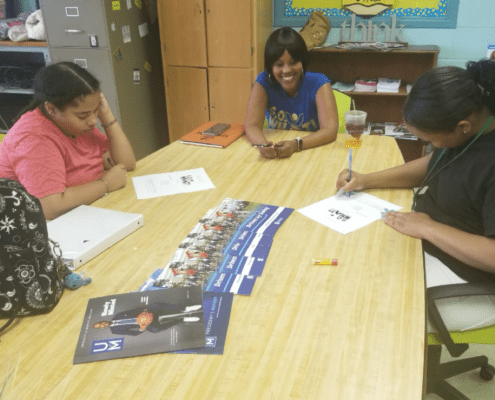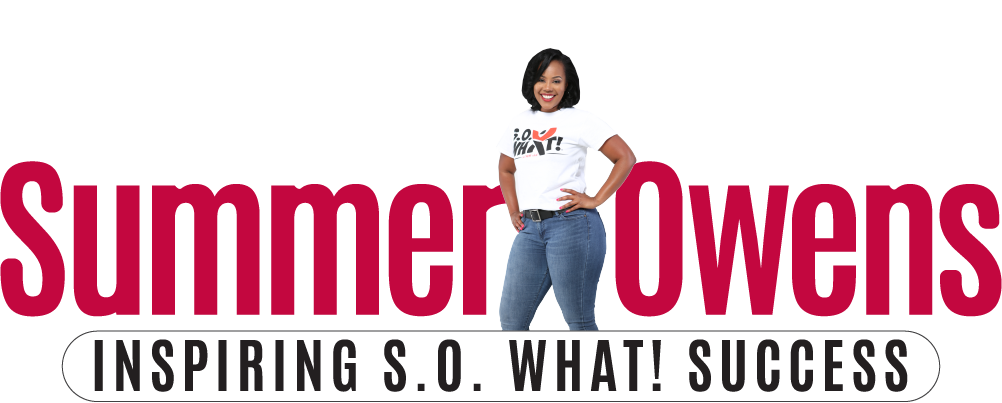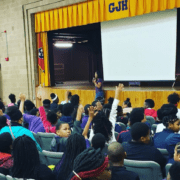So What are the Basic Life Skills
Basic life skills are a set of skills which help you prosper and advance in everyday life.
You find that you will need different sets of like skills at different times in your life.
There are 10 basic essential life skills. Because my book and the S.O. What! Literacy, Life Skills, and Curriculum follow my life, it was not a challenge to teach these life lessons just by pulling information from the reading students were already doing.
The basic life skills are problem-solving, critical thinking, effective communication skills, decision-making, creative thinking, interpersonal relationship skills, self-awareness building skills, empathy, and coping with stress and emotions.
For example, in school, you will need study skills. This includes the ability to research, write assignments, plan your time, and complete a term paper, dissertation or thesis.
When looking for a job, you need employability skills such as communication skills, problem-solving, decision-making and collaboration. These skills also come in handy when you work with others and are different from skilled trades.
We can group life skills into seven categories:
- Housekeeping
- Technical
- Survival skills
- Money management
- Self-awareness
- Relationship
- Wellness and mental health

Let’s look at each category of the basic life skills in more detail:
-
Housekeeping includes everything that has to do with managing a home.
- Cooking: knowing how to prepare healthy meals is a worthy life skill.
- Cleaning: a lived-in home gets dirty and you need to know how to clean floors, the bathroom, kitchen, surfaces, and other living areas. Cleaning includes doing the laundry.
- Sewing: the use of a needle and thread is a worthwhile skill to have.
- Repairs (DIY): knowing how to do basic repairs around the house is a useful life skill. Not only does it save money where the repairs are minor, but it also teaches you problem-solving skills.
- Using kitchen appliances: you need to know how to use different kitchen appliances like the dishwasher and the oven.
-
Technical skills
- Time/calendar management: knowing how to use your time well is a handy skill.
- When you are in school, you need to plan your time well.
- When you go off to college you are expected to balance coursework, a social calendar, sports.
- Calendar management skills will also help you later when you balance work, family life and possibly school.
- Writing and research skills: you need both skills for school assignments and papers. At work, you will use these writing skills to write emails and reports. Research is also a step in the decision-making and problem-solving process.
- Public speaking and presenting: Debates, meetings and public forums are some places you can use these skills.
- Excellent communication skills are the centre of all relationships, whether business or personal. Excellent communication skills help you build rapport, pass your message across, and get support for your ideas.
- Technology skills: knowing which applications and programs to use for different tasks. This also includes understanding when and how to back up files. It’s important to stay safe online. You can do that by protecting your passwords and personal information.
- Basic troubleshooting skills: at the very least you need to know what to do in a few common scenarios. For example, if you don’t have a network connection signal on your computer, you know to check if the router is switched on. Or if at work your document isn’t printing, you need to know to check the power outlet, and the cables.
-
Survival skills
We all need these skills – not only scouts on their wilderness challenge. Survival skills include:
- Knowing how to stay safe when at home or out in public
- Being prepared for emergencies
- Basic first aid
- How to survive without electricity
- Navigation and how to read a map
- Being able to fix a flat tire
-
Workplace readiness skills
Also called employability skills, workplace readiness skills prepare you for your future job. The skills will help you gain and maintain employment.
- Workplace etiquette is knowing how to act and carry yourself at work. It includes knowing what you should and shouldn’t do, how to work with others, teamwork and collaboration, giving and receiving feedback, how to communicate effectively with your boss, social media and work, who and how to ask for help, and how to navigate office politics.
- Good interviewing skills will help you land a job. This skill enables you to answer the interviewers questions succinctly. It guides you through tricky interview questions like how much you expect to be paid and why you think they should hire you.
- Attitude is another important aspect of work readiness. To succeed at work, you need a positive attitude and a growth mindset. A positive attitude keeps you sane when work isn’t as exciting as you expected. Or when you have to do grunt work on your way up. A growth mindset allows you to keep learning and growing as you advance in your job.
- A common complaint many managers have is about work ethic. They often meet new graduates and employees who want to earn huge salaries but are unwilling to put in the work. There’s nothing wrong with earning a good salary, however, you will need to earn it. A strong work ethic means you’re not afraid of doing the hard work, you take responsibility for your work and you deliver when you say you will.
-
The nature of work today is digital.
- For people entering the workplace, computer skills are a must-have skill. They will also need to understand how to use the internet and communicate using the appropriate technologies.
- The term 21st century skills has been on the lips of many for a while now. These are the skills anyone needs to work and thrive in a rapidly evolving landscape. They include flexibility, problem solving, critical thinking, innovation, creativity, and teamwork.
-
Money Management
Money management is a core life skill which includes these elements:
- Budgeting: making a plan for your money before you spend it
- Debt: understanding what debt is, how it works and how it can affect your finances
- Planning for major purchases: at some point in your life, you will make a major purchase like a house. Understanding how to plan towards this time in your life is a game-changer.
- Saving: is a habit which everyone needs to adopt as early as possible
- Balancing your checkbook: it’s amazing how many people struggle with this.
- Taxes: understanding tax brackets, taxes payable and how to file your taxes
- Record keeping: it’s important to track your spending
- Investing: start building your assets as early as possible for maximum returns
-
Self-awareness
Self-awareness will save you from the heartache of job mismatch. It also helps you relate with others. Ask and answer these questions to gain self-awareness:
- Who you are?
- What are your strengths and weaknesses?
- Which things make you laugh?
- Which things make you cry?
- What do you dream about?
- What knowledge, skills and attributes do you possess?
- What makes you tick?
- What are your personal values?
- What/Who matters most to you?
- What are your priorities and focus?
-
Relationship skills
They say love makes the world go round. But maybe they should have said relationships. Whether business or personal, we work and care about people we have a connection (relationship) with.
- Communication skills help you pass your message, and receive feedback regardless of the medium you use.
- Listening skills help build relationships and enhance communication. Active listening is more than hearing the words, it involves hearing the unspoken thoughts. It is listening without an agenda or thinking about what you will answer as the other person speaks.
- Giving and receiving feedback is another invaluable life skill. Learning how to take feedback without taking it personally is as important as giving feedback without blaming the other person.
- Gratitude changes your perspective of life. As you start to take stock of the things you have, and the things which are going right, you recognize how blessed and fortunate you are. We can take many things for granted. But an attitude of gratitude keeps you in check and increases your empathy towards others.
-
Wellness and mental health – your mental health is as important as your physical health.
- Critical thinking & problem solving are two skills which improve your mental health. Both skills apply the use of questioning. And there’s no tool as powerful as asking questions to release you from the bonds of overthinking, self-sabotage and inferiority complex.
- Self-care includes getting adequate rest, sleep, and hygiene. The human body and mind need to rest often. Learn to take rest regularly – before your body demands it. Rest rejuvenates your body while revitalizing your mind. For fear of stating the obvious, take a birth/shower every day. People might smell you but not have the courage to approach you and tell you that you stink.
A person who has the basic essential life skills is well on their way to a richer life. Better still, they can teach others who then teach others.
______________________________________________________________________________________________________
I’m Summer Owens, and my passion is helping youth and young adults realize success no matter what obstacles they face. As an international resilience and leadership keynote speaker, author, S.O. What! Success Coach, and creator of the S.O. What! Literacy, Life Skills, and Character Education curriculum, I empower people to say, “So what!” to even their greatest challenges. provide a framework to help people see past their challenges and focus on solutions using the S.O. What! Success System (Overcome Obstacles + Eliminate Excuses + Calculate Choices = S.O. What! Success). Through keynotes, workshops, books, online courses, and workbooks, I use life’s challenges and my own story of resilience as a rape survivor and teen mom success story to help others confidently pursue their dreams.
Looking for an inspiring college motivational speaker? A high school literacy curriculum? A middle school life skills workbook? A great example for teen mothers? A women’s empowerment or single mother’s conference speaker? I’m your girl and will help any audience say, “S.O. What!”.









